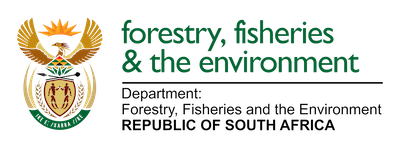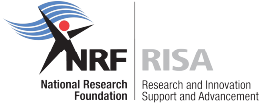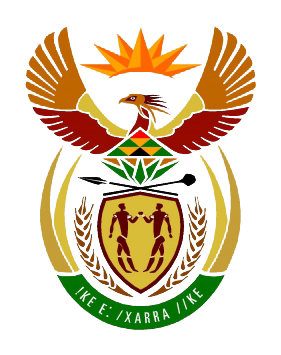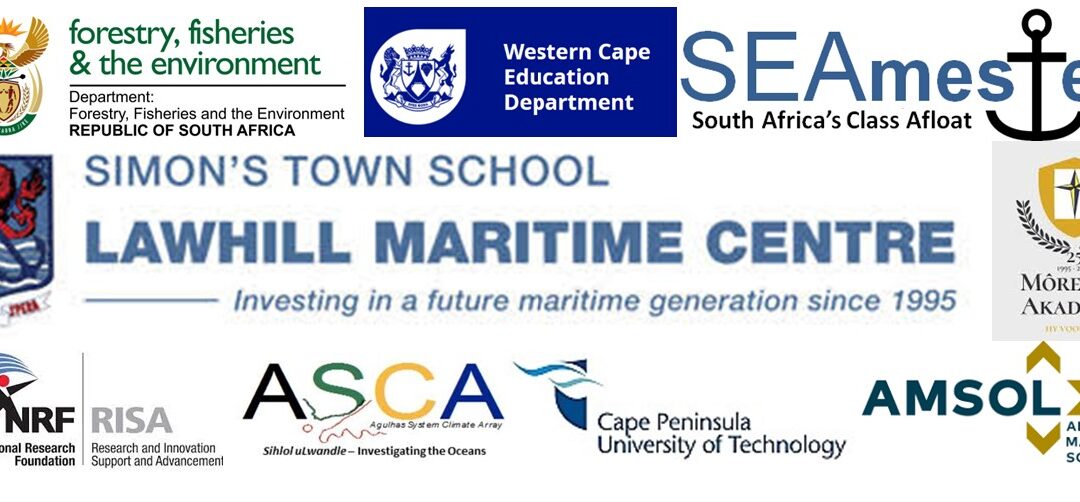
by Ria Olivier | Aug 5, 2024 | SEAmester
Minster David Maynier of the the Western Cape Education visit the S.A.Agulhas II with the two learners Akhona Zhondo and Aimee Stollie that attended the SEAmester VII voyage
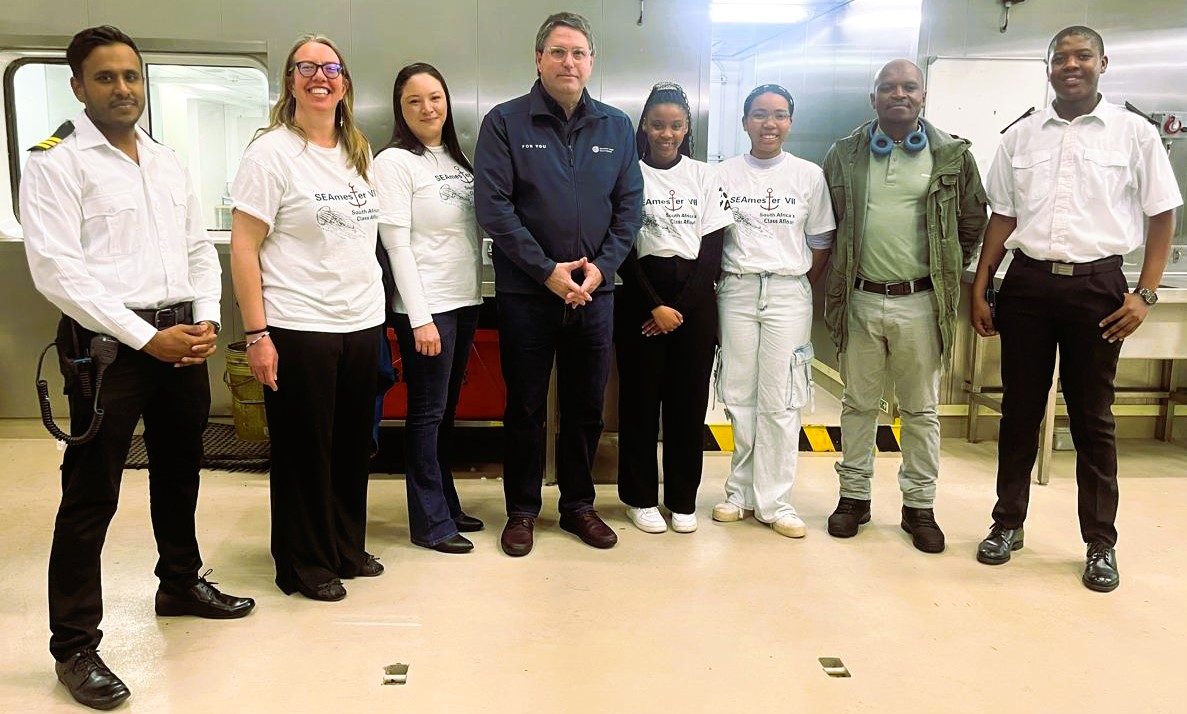 Above(l-r)Chief Officer Sanesh Jugroop (AMSOL), Dr Mariëtte Wheeler (WCED), Dr Courtney Puckree-Padua (CPUT), Minister David Maynier (WCED), Akhona Zondo (Lawhill Maritime Centre, Simon’s Town School), Aimee Stollie (Môrester Akademie, Vanrhynsdorp), Rodgerson Hlophe (Deputy Director: Vessel and Helicopter Management, DFFE), Navigation Cadet Nhlakanipho Khumalo (AMSOL)
Above(l-r)Chief Officer Sanesh Jugroop (AMSOL), Dr Mariëtte Wheeler (WCED), Dr Courtney Puckree-Padua (CPUT), Minister David Maynier (WCED), Akhona Zondo (Lawhill Maritime Centre, Simon’s Town School), Aimee Stollie (Môrester Akademie, Vanrhynsdorp), Rodgerson Hlophe (Deputy Director: Vessel and Helicopter Management, DFFE), Navigation Cadet Nhlakanipho Khumalo (AMSOL)
WCED press release click here
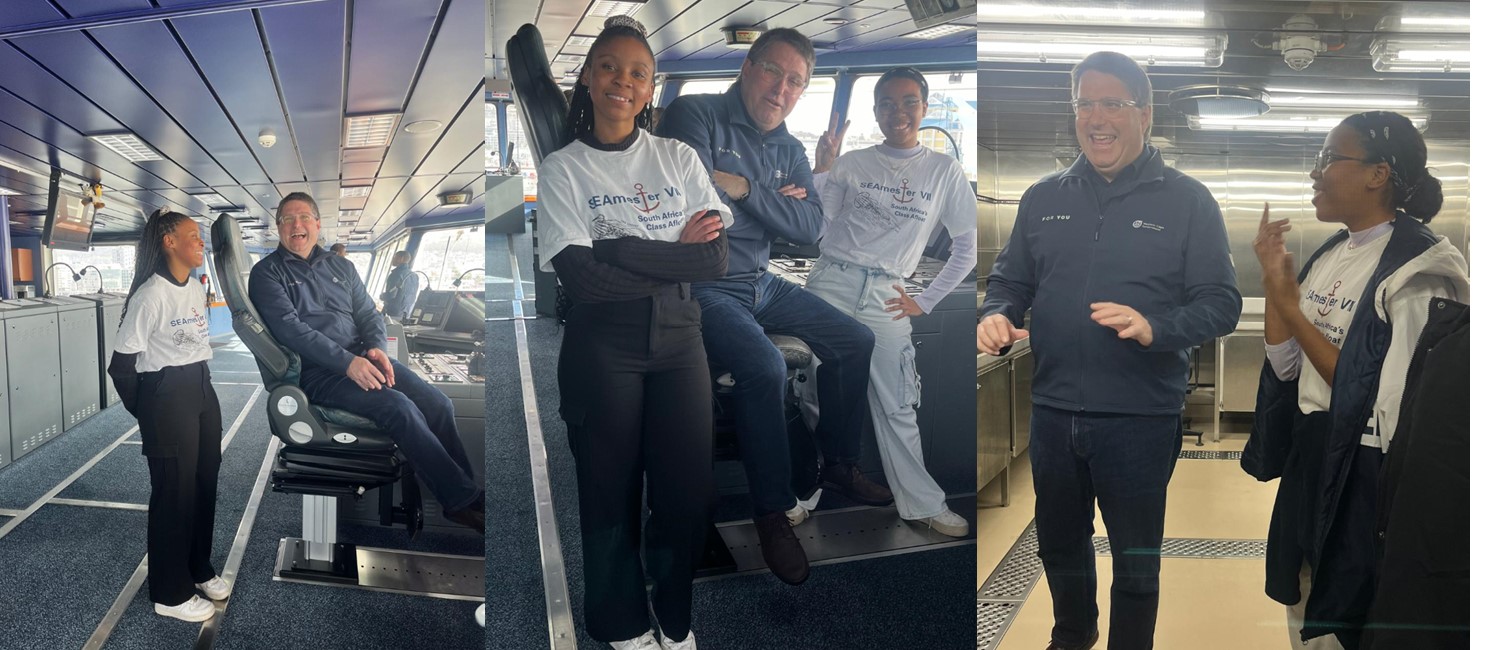 Lighter moments during the visit with Minister Maynier and Akhonda and Aimee
Lighter moments during the visit with Minister Maynier and Akhonda and Aimee
 Images: Mariette Wheeler
Images: Mariette Wheeler
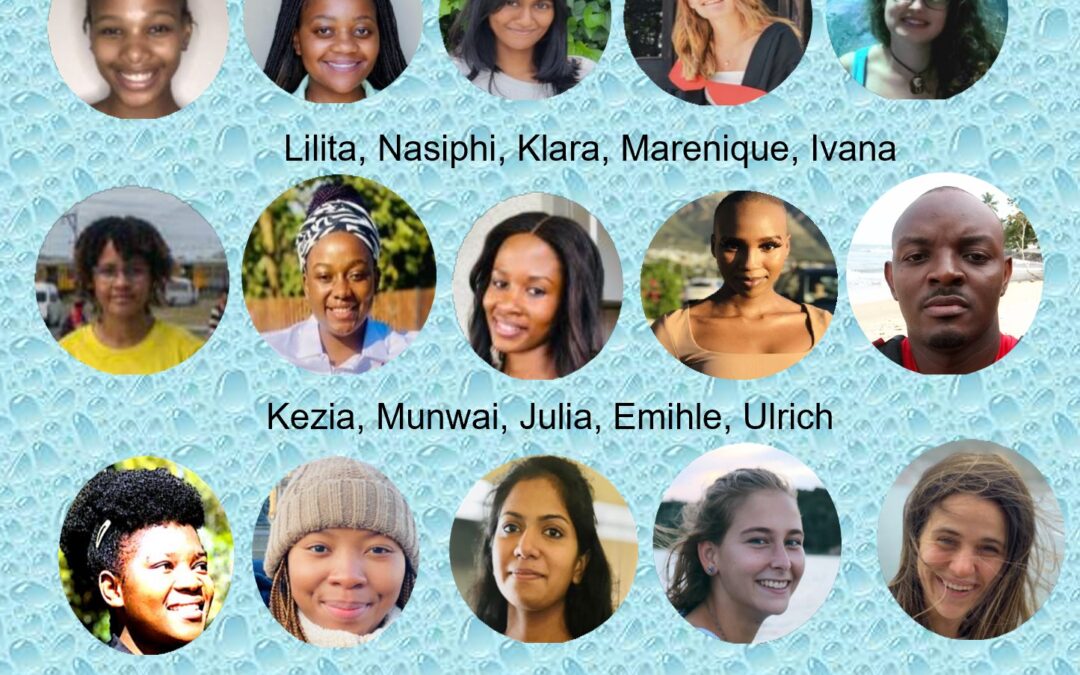
by Ria Olivier | Jun 27, 2024 | SEAmester
Read more about the Students an learners here

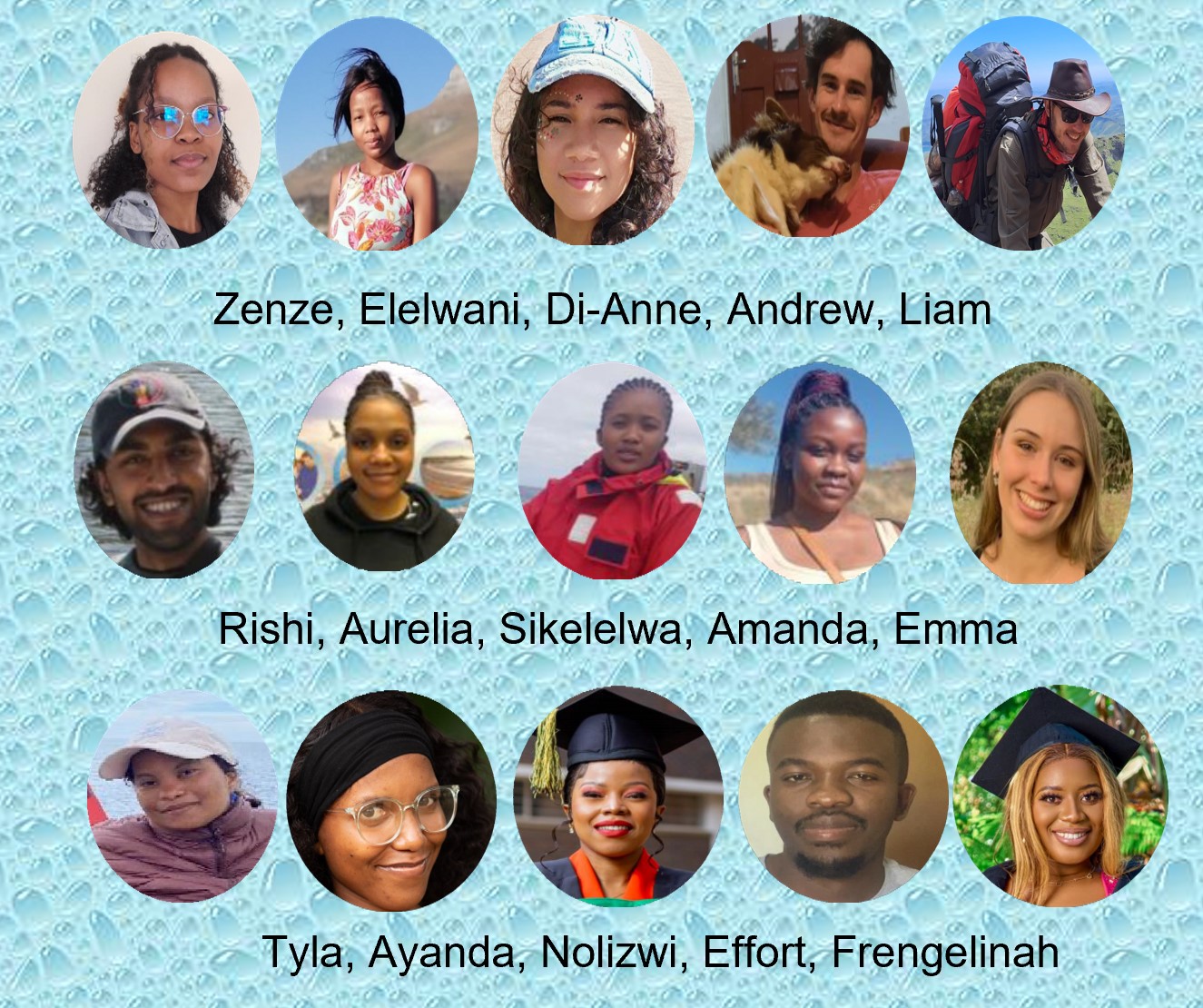
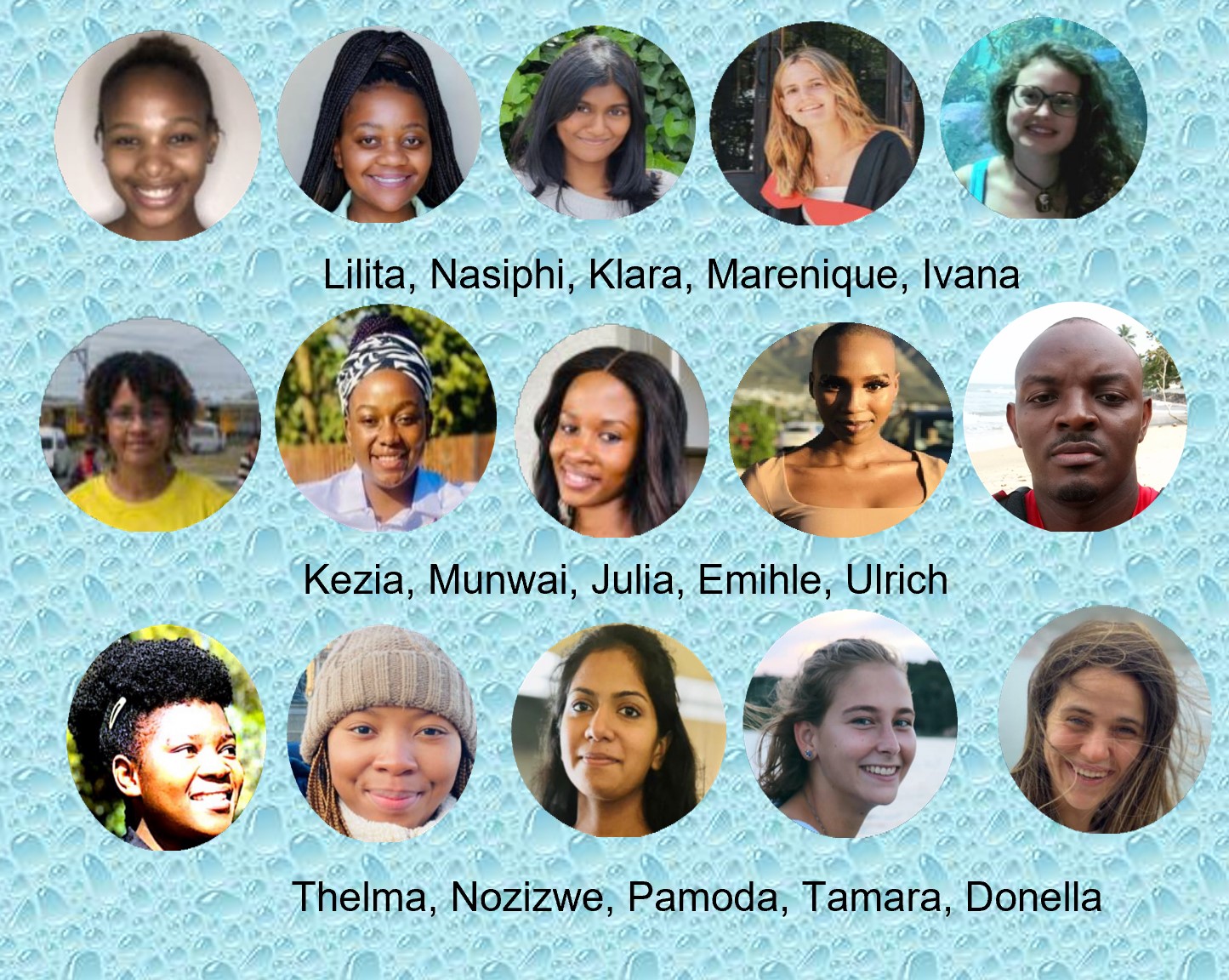
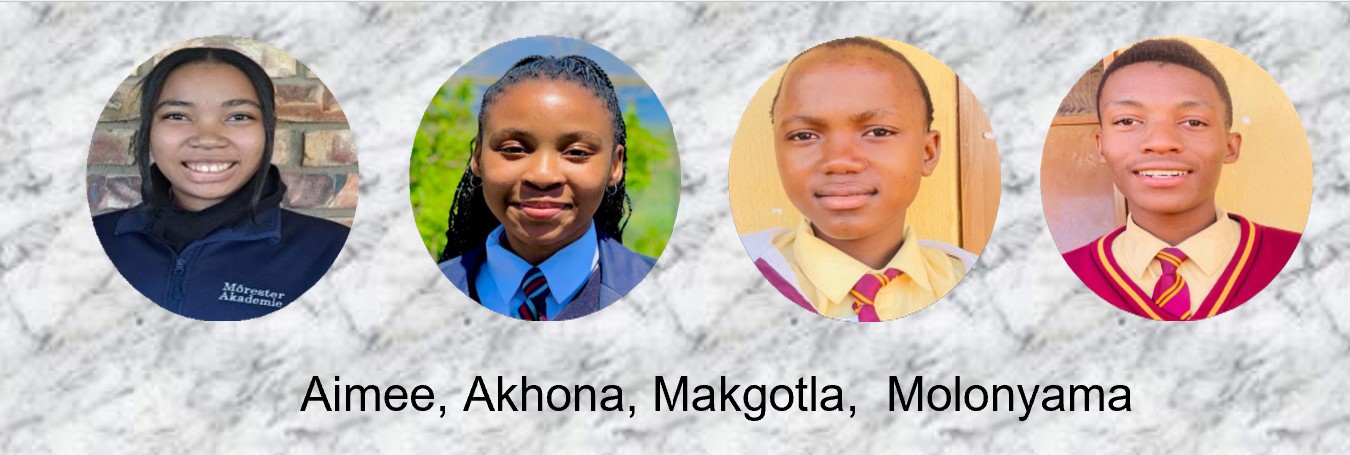

by Ria Olivier | Jun 26, 2024 | SEAmester
SEAMESTER VII departed last Tuesday from East Pier in Cape Town and is now in the Southern Ocean. Introducing the lecturers on board. available here






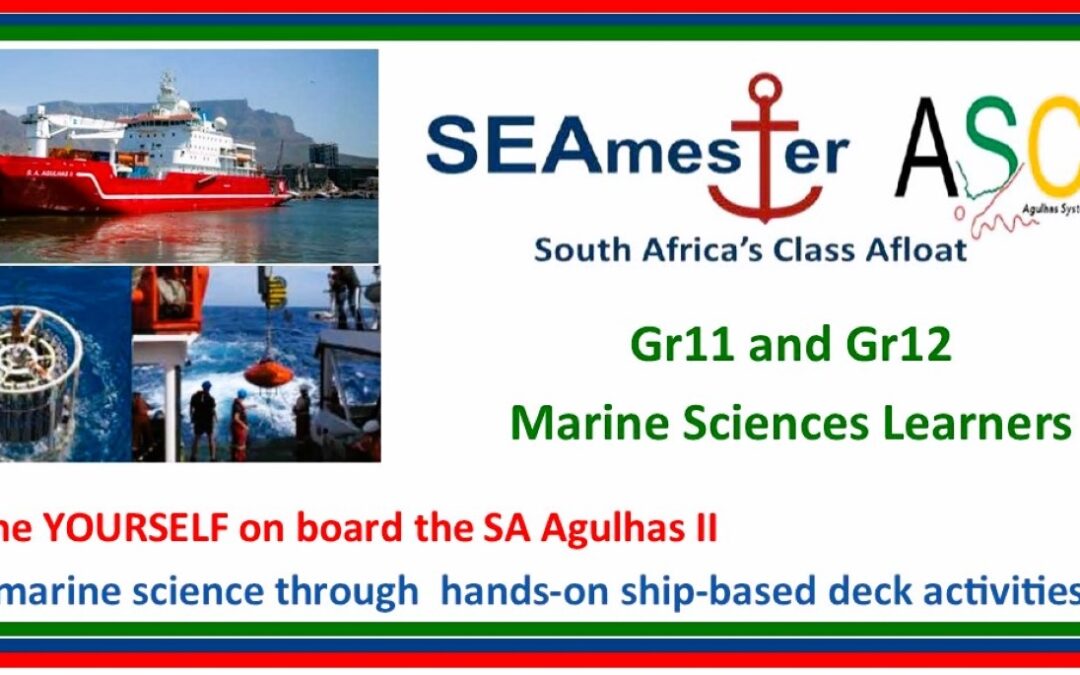
by Ria Olivier | Apr 11, 2024 | Announcement, SANAP, SEAmester
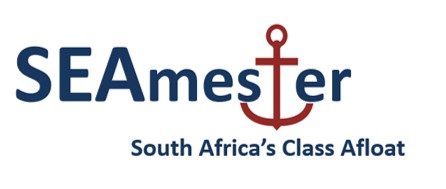 LEARNER (FET) APPLICATION FORM
LEARNER (FET) APPLICATION FORM
- Applications need to be completed by
- * No late or incomplete applications will be considered. (CLOSINGDATE 19 APRIL)
- SEAmester VII dates are 24th June to 4th July 2024
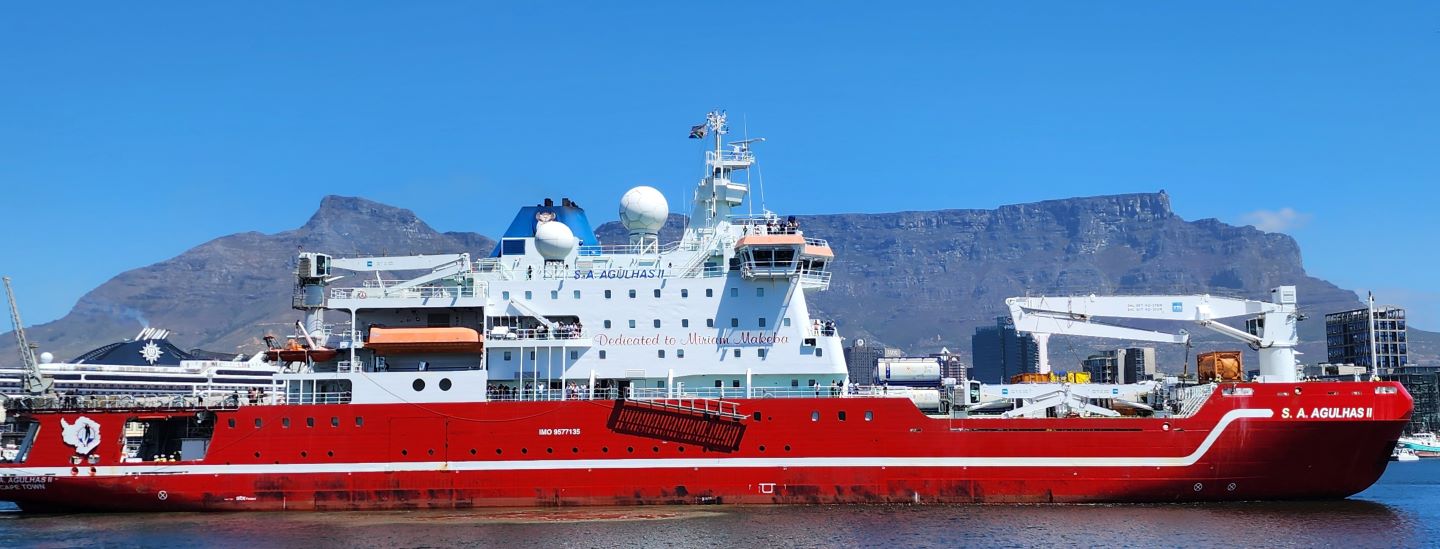 SEAmester – South Africa’s Class Afloat aims to introduce marine science as an applied and cross- disciplinary field to students who have shown an interest in the core science disciplines. It combines traditional classroom lectures with hands-on ship-based deck activities; while providing them with an opportunity to support specialist scientists in recognised marine research activities. During the voyage, students will engage in classroom lectures, assignments, and hands-on research activities, covering topics such as physical oceanography, marine biology and environmental science. Learners will also work with sophisticated instrumentation, collect data and gain experience in data analysis and scientific research techniques. The research group comprises over 30 oceanographic, fisheries, biogeochemical and biological experts, who jointly have trained over 600 Southern African students onboard a wide variety of international and local research vessels.
SEAmester – South Africa’s Class Afloat aims to introduce marine science as an applied and cross- disciplinary field to students who have shown an interest in the core science disciplines. It combines traditional classroom lectures with hands-on ship-based deck activities; while providing them with an opportunity to support specialist scientists in recognised marine research activities. During the voyage, students will engage in classroom lectures, assignments, and hands-on research activities, covering topics such as physical oceanography, marine biology and environmental science. Learners will also work with sophisticated instrumentation, collect data and gain experience in data analysis and scientific research techniques. The research group comprises over 30 oceanographic, fisheries, biogeochemical and biological experts, who jointly have trained over 600 Southern African students onboard a wide variety of international and local research vessels.
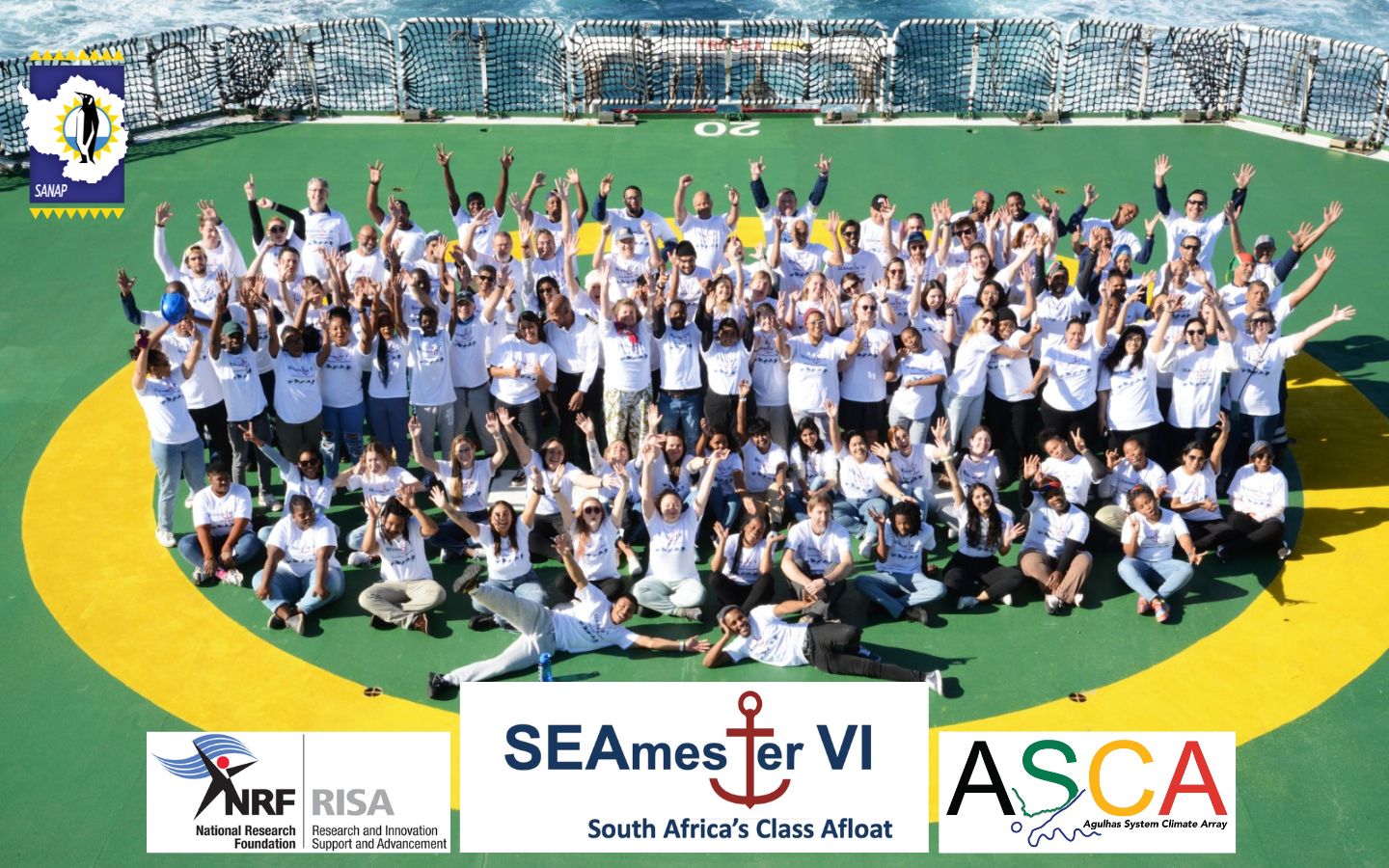
The SEAmester programme is usually offered to 40 post-graduate students. With the introduction of Marine Sciences in the FET phase, the SEAmester team, led by Prof. Isabelle Ansorge from the University of Cape Town, has made available two spaces for high-school learners. These two learners will be selected through an objective process. The team invites full-time Grade 11 and Grade 12 learners to apply for and potentially be selected for this amazing opportunity.
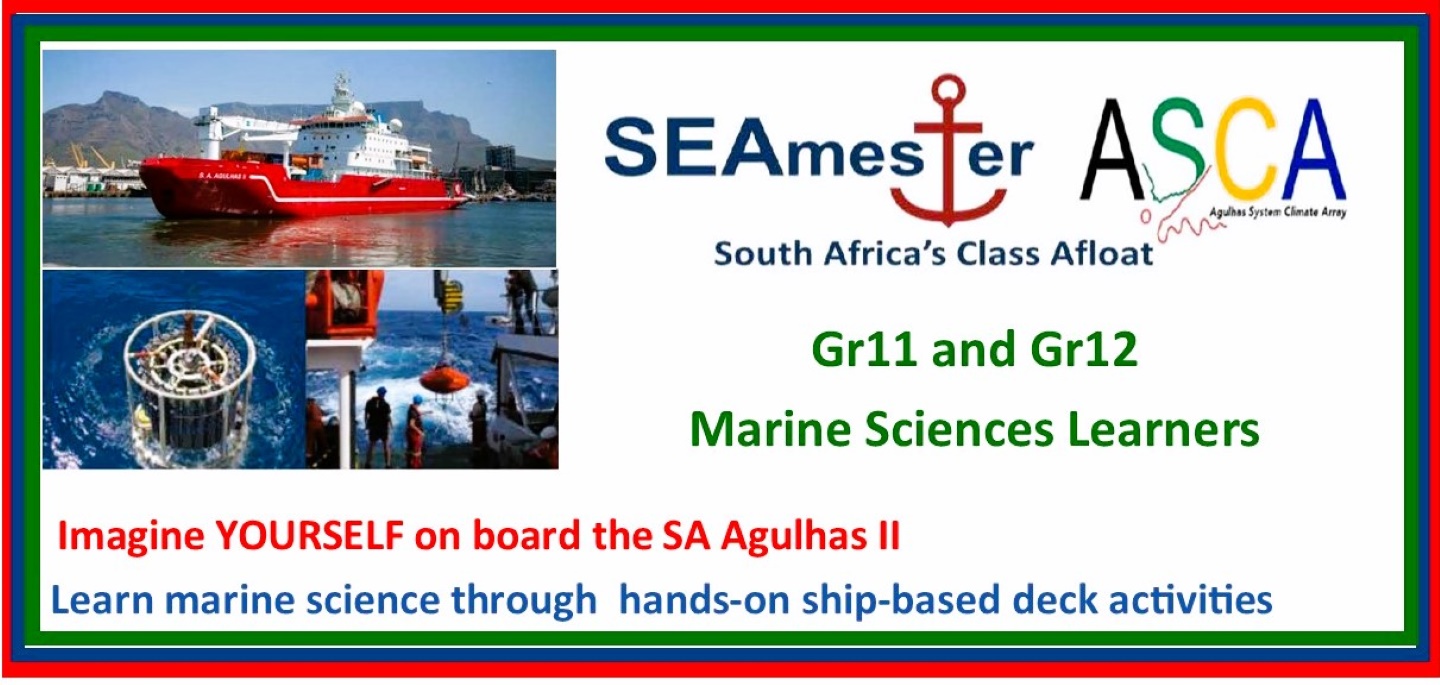 APPLICATION REQUIREMENTS
APPLICATION REQUIREMENTS
- CLOSING DATE 19 APRIL 2024
- To apply to be part of this amazing opportunity:
- Applicants must be full-time in Grade 11 or Grade 12 in 2024.
- Applicants must be doing Marine Sciences as school subject in Grade 11 or Grade 12.
- Applicants must have a passion for marine sciences and an enthusiastic attitude .
- Applicants must provide a 350 – 500, covering:
- your understanding of the importance of marine science research on vessels such as the SA Agulhas II
- a motivation as to why you should be selected to be part of SEAmester – South Africa’s class afloat, and what you hope to gain from this
- be available to be on board the research ship from 24 June to 4 July 2024 (a valid passport would be required)
Sounds like a dream potentially coming true?
- Go to: https://forms.gle/fBSN3dZVLRHJJmWf9
- Complete the relevant
- Upload an official copy of your Term 1, 2024 academic
- Upload a copy of your essay
- Any questions regarding your application? Email:
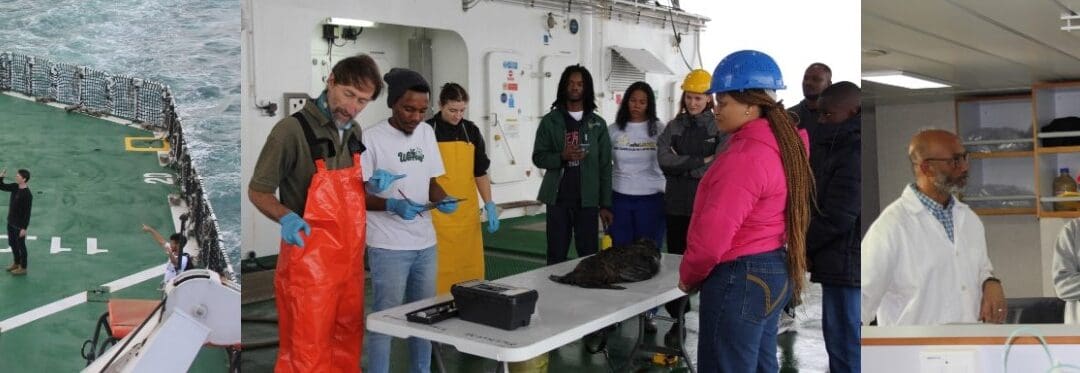
by Ria Olivier | Mar 20, 2024 | Research, SA Agulhas II, SANAP, SEAmester
 Training Tomorrow’s Oceanographers
Training Tomorrow’s Oceanographers
SEAmester’s success is evident in the academic achievements of its participants. A total of 254 students from over 26 institutes and universities have participated in the program, gaining comprehensive knowledge in oceanography, marine biology, atmospheric forecasting and navigation. The curriculum, developed in collaboration with leading marine scientists and lecturers across South Africa, ensures a balance between theoretical concepts and practical training of skills. SEAmester participants have contributed to several news publications, presenting their findings at national and international (SANAP 2023, IUGG 2023, @SEAnetwork 2022, VC award Ocean Womxn) conferences and workshops.
 The program’s emphasis on research skills and scientific inquiry has empowered students to continue to make meaningful contributions to the field of marine science. Graduates of SEAmester have gone on to pursue advanced degrees and have secured positions in reputable research institutions, environmental organizations, and marine industries. The alumni network continues to grow, fostering collaboration and knowledge exchange between the cohort of SEAmester students. SEAmester’s success is further exemplified by the growing number of partnerships with academic institutions. Collaborative research projects, joint degree programs, and faculty exchanges have strengthened ties between SEAmester and leading universities in South Africa. International Collaborations: SEAmester is actively exploring partnerships with renowned international institutions to enhance the global reach of its educational offerings. Collaborative research projects and student exchanges will further enrich the program’s diversity and perspective. (Above SEAmester 2023)
The program’s emphasis on research skills and scientific inquiry has empowered students to continue to make meaningful contributions to the field of marine science. Graduates of SEAmester have gone on to pursue advanced degrees and have secured positions in reputable research institutions, environmental organizations, and marine industries. The alumni network continues to grow, fostering collaboration and knowledge exchange between the cohort of SEAmester students. SEAmester’s success is further exemplified by the growing number of partnerships with academic institutions. Collaborative research projects, joint degree programs, and faculty exchanges have strengthened ties between SEAmester and leading universities in South Africa. International Collaborations: SEAmester is actively exploring partnerships with renowned international institutions to enhance the global reach of its educational offerings. Collaborative research projects and student exchanges will further enrich the program’s diversity and perspective. (Above SEAmester 2023)
 As the field of ocean science evolves, SEAmester is committed to incorporating emerging disciplines such as marine robotics, climate science, and biotechnology into its curriculum. This ensures that students are well-prepared for the challenges and opportunities of the future direction and foci of marine sciences. Recognizing the importance of accessibility, SEAmester continues to develop and teach digital learning/mapping/visual platforms to complement its on-board training.
As the field of ocean science evolves, SEAmester is committed to incorporating emerging disciplines such as marine robotics, climate science, and biotechnology into its curriculum. This ensures that students are well-prepared for the challenges and opportunities of the future direction and foci of marine sciences. Recognizing the importance of accessibility, SEAmester continues to develop and teach digital learning/mapping/visual platforms to complement its on-board training.
“SEAmester gave me hope… hope that if you look, opportunities will unfold.” – Ntando.
Below examples of the many articles and presentations coming out of the programme…
A report which is a poll of all 6 SEAmester student cohorts on the importance of their SEAmester experience in shaping their studies, career trajectory etc. will be published soon.
IMAGES available on ALSA archive
Text by Isabelle Ansorge.

by Ria Olivier | Feb 8, 2024 | SANAP, SANAP Student, SEAmester
During the 6th Symposium sessions were allocated to cross cutting disciplines and it led to great presentations and discussions. After the governance session on the 2nd day of the symposium a few cross-cutting themes took place. This post focus on:
CAPACITY DEVELOPMENT within SANAP
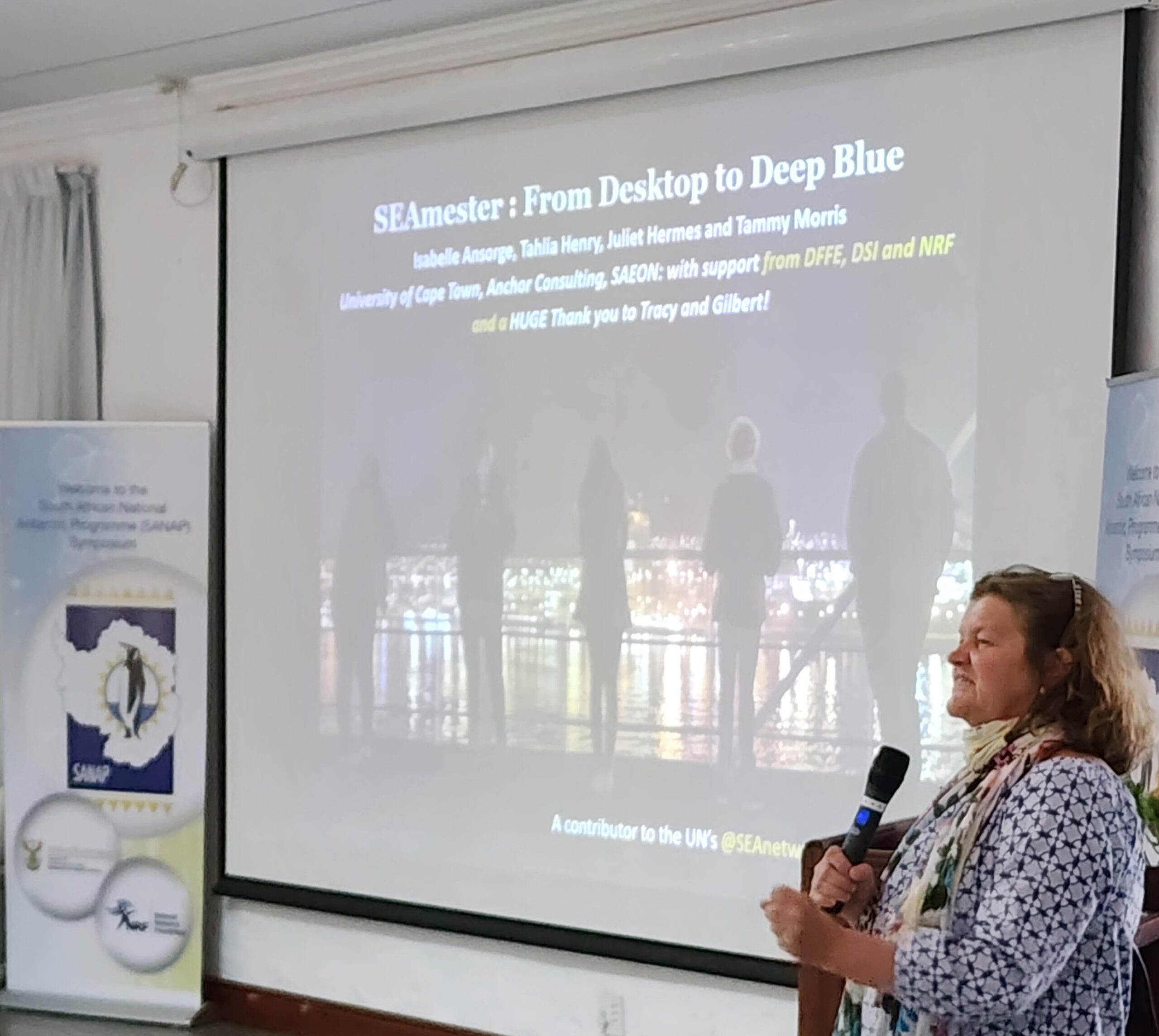 Prof Isabelle Ansorge of UCT and PI of SEAmester chaired the session on capacity development and she introduce the session with the presentations: “SEAmester 6 Voyages later.”
Prof Isabelle Ansorge of UCT and PI of SEAmester chaired the session on capacity development and she introduce the session with the presentations: “SEAmester 6 Voyages later.”
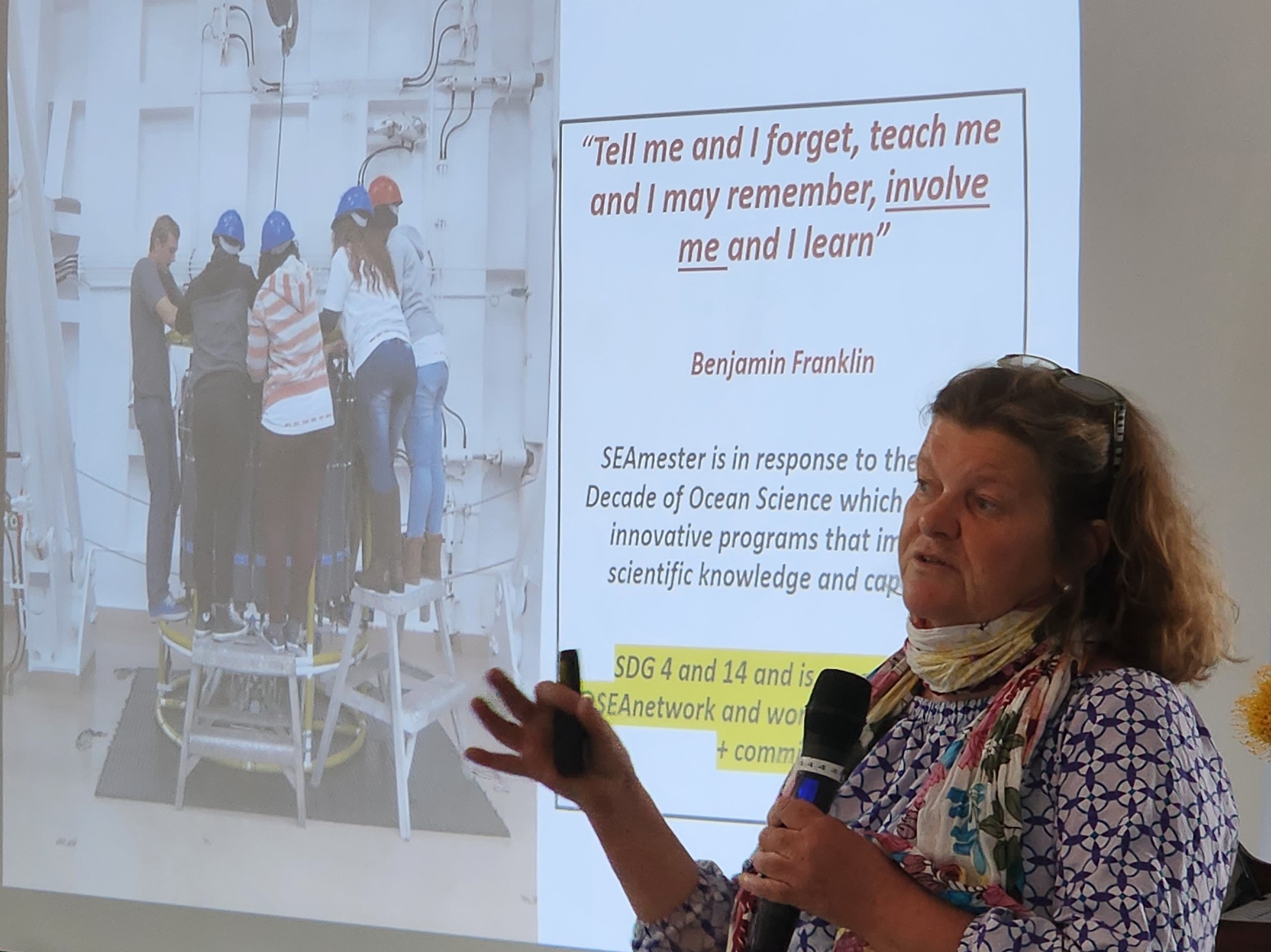
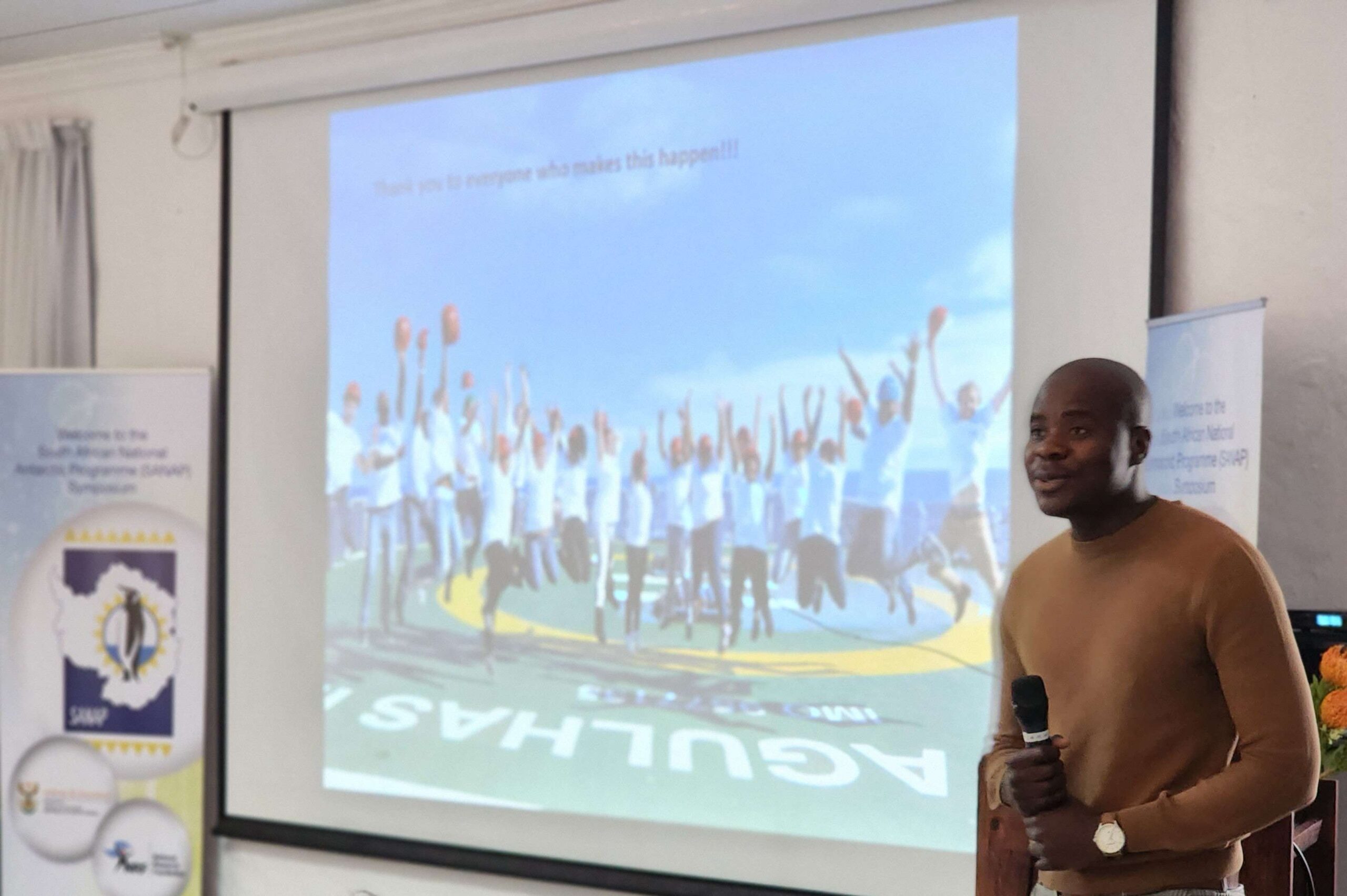 She outlined the strength of SEAmester is that it combines theoretical classroom learning with the application of this knowledge through ship-based, and more importantly, hands-on research through the Agulhas System Climate Array (ASCA) programme. During past voyages 241 students from 26 universities all over South Africa having participated in these cruises. The presentation showed how successful this programme has been, but also the challenges that have been faced. A few were showcased of what has become of some of the SEAmester students.
She outlined the strength of SEAmester is that it combines theoretical classroom learning with the application of this knowledge through ship-based, and more importantly, hands-on research through the Agulhas System Climate Array (ASCA) programme. During past voyages 241 students from 26 universities all over South Africa having participated in these cruises. The presentation showed how successful this programme has been, but also the challenges that have been faced. A few were showcased of what has become of some of the SEAmester students.  Isabelle’s presentation was followed by two SEAmester students. Themba Mbalati(above left) a SEAmester student gave a presentation on:” The perceptions of participants on the impact of South Africa’s Class Afloat Program (SEAmester) and its links with travel and tourism.”
Isabelle’s presentation was followed by two SEAmester students. Themba Mbalati(above left) a SEAmester student gave a presentation on:” The perceptions of participants on the impact of South Africa’s Class Afloat Program (SEAmester) and its links with travel and tourism.”
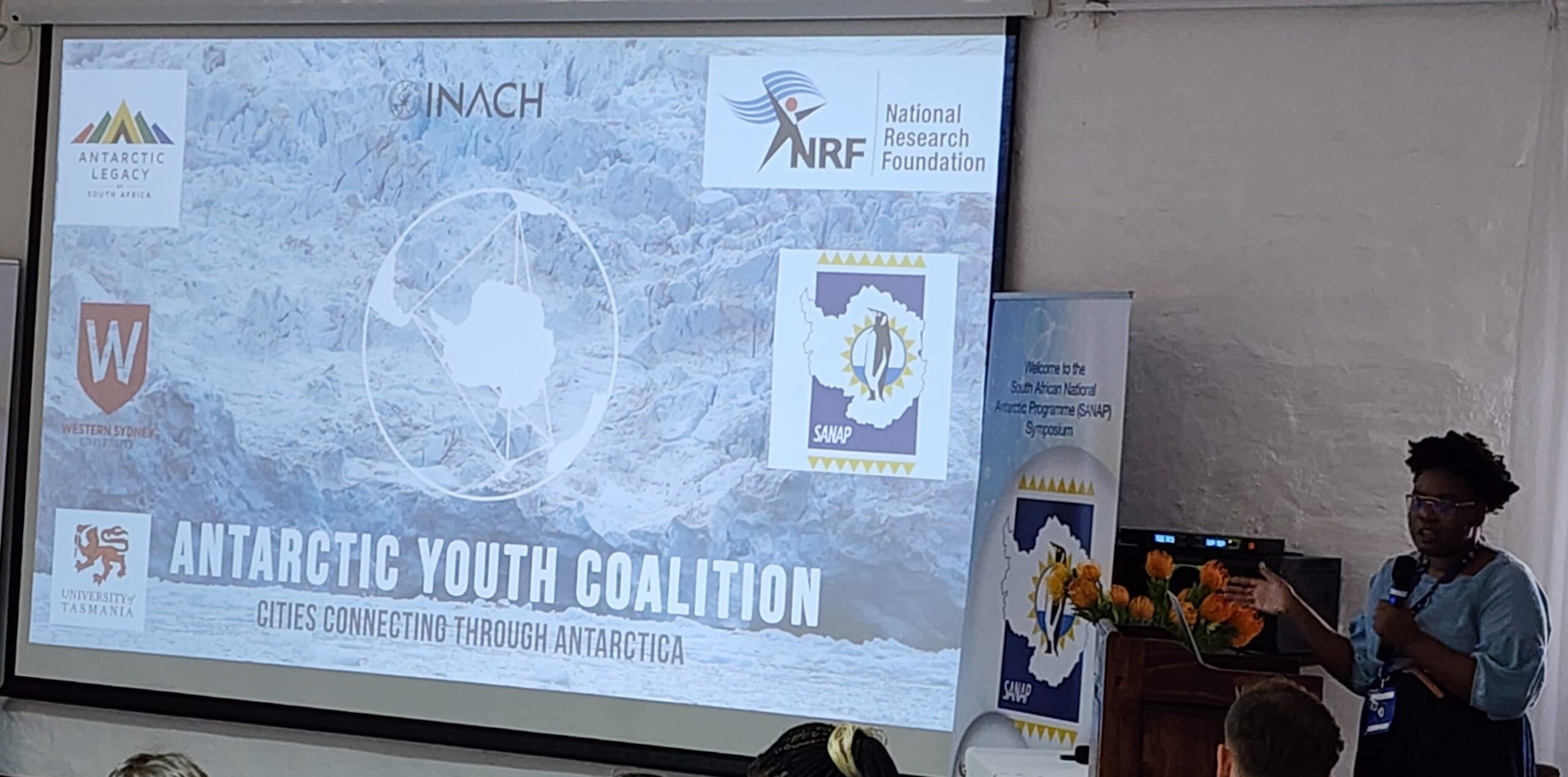
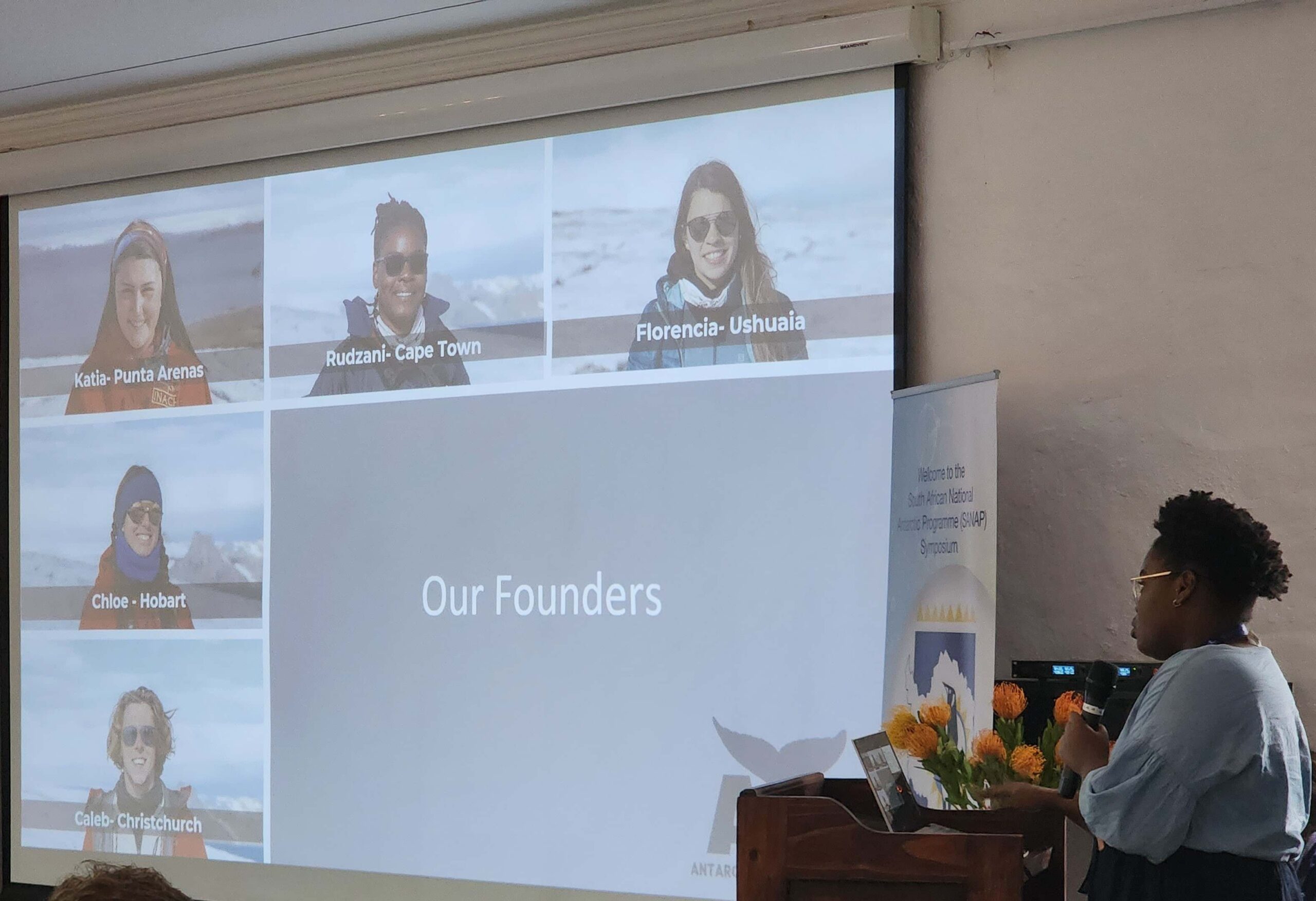 Rudzani Silima, the top student for SEAmester in 2019 gave a presentation on the Antarctic Youth Coalition. Rudzi become part of this coalition when she has been nominated the top student. She outlined the aim and mission of the AYC and the importance of attracting new members and challenge the Gateway cities into practicing sustainability, using the model of Antarctic governance for instance, cooperation, diplomacy, science and best of all collaboration between countries to meet a sustainable end.
Rudzani Silima, the top student for SEAmester in 2019 gave a presentation on the Antarctic Youth Coalition. Rudzi become part of this coalition when she has been nominated the top student. She outlined the aim and mission of the AYC and the importance of attracting new members and challenge the Gateway cities into practicing sustainability, using the model of Antarctic governance for instance, cooperation, diplomacy, science and best of all collaboration between countries to meet a sustainable end.
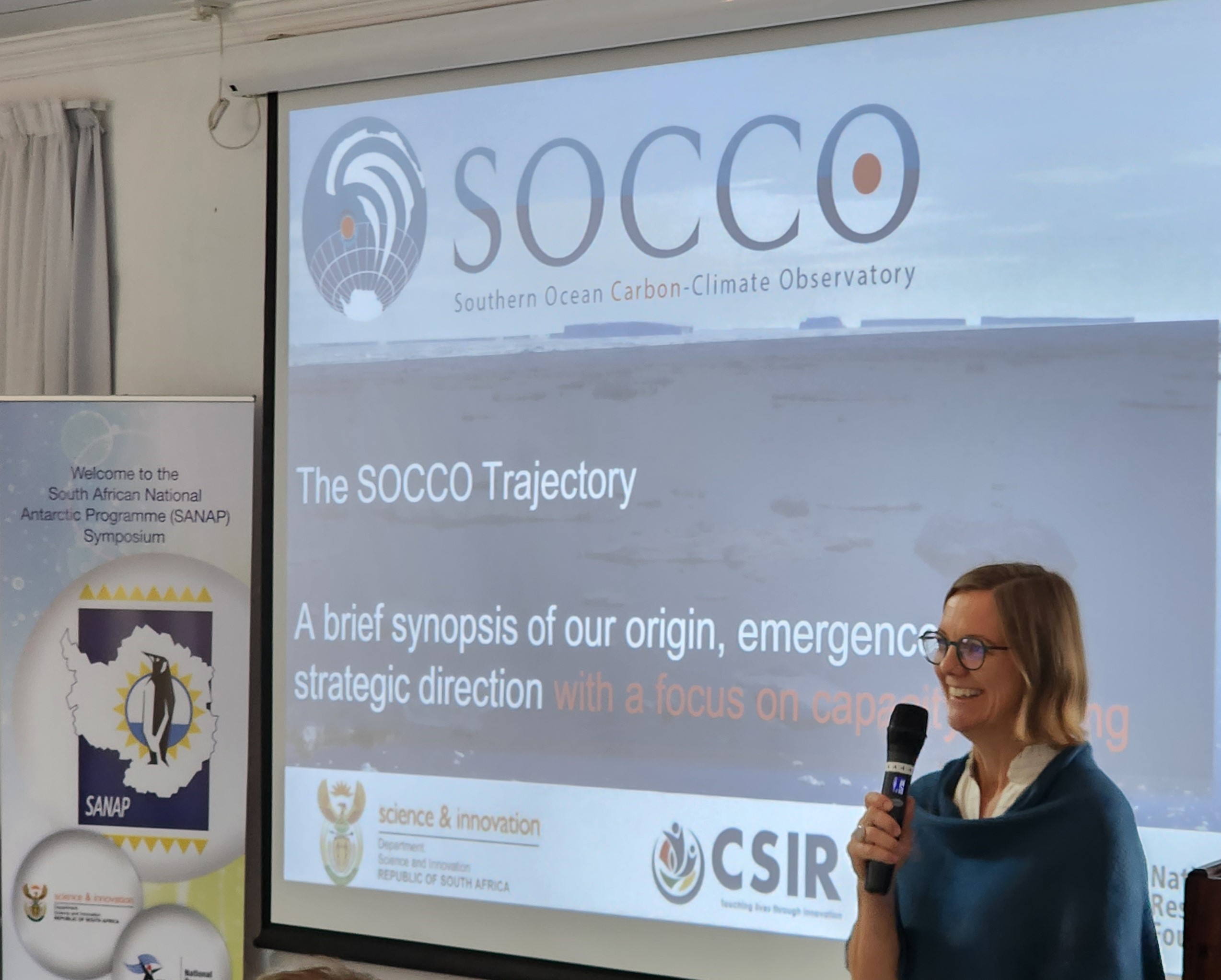
 Sandy Thomalla of SOCCO concluded the session with the presentation:” The SOCCO Trajectory – A brief synopsis of our origin, emergence and strategic direction”. The presentation gave the impact of SOCCO that continues to make a growing contribution to our understanding of the role that fine-scale dynamics play in shaping the phasing and magnitudes of the seasonal cycle and its inter-annual variability. Phase IV will bring the Ocean Climate science to the south African society.
Sandy Thomalla of SOCCO concluded the session with the presentation:” The SOCCO Trajectory – A brief synopsis of our origin, emergence and strategic direction”. The presentation gave the impact of SOCCO that continues to make a growing contribution to our understanding of the role that fine-scale dynamics play in shaping the phasing and magnitudes of the seasonal cycle and its inter-annual variability. Phase IV will bring the Ocean Climate science to the south African society.
Please see more posts on Cross-Cutting themes such as infrastructures and data management on the SANAP website!

 Above(l-r)Chief Officer Sanesh Jugroop (AMSOL), Dr Mariëtte Wheeler (WCED), Dr Courtney Puckree-Padua (CPUT), Minister David Maynier (WCED), Akhona Zondo (Lawhill Maritime Centre, Simon’s Town School), Aimee Stollie (Môrester Akademie, Vanrhynsdorp), Rodgerson Hlophe (Deputy Director: Vessel and Helicopter Management, DFFE), Navigation Cadet Nhlakanipho Khumalo (AMSOL)
Above(l-r)Chief Officer Sanesh Jugroop (AMSOL), Dr Mariëtte Wheeler (WCED), Dr Courtney Puckree-Padua (CPUT), Minister David Maynier (WCED), Akhona Zondo (Lawhill Maritime Centre, Simon’s Town School), Aimee Stollie (Môrester Akademie, Vanrhynsdorp), Rodgerson Hlophe (Deputy Director: Vessel and Helicopter Management, DFFE), Navigation Cadet Nhlakanipho Khumalo (AMSOL) Lighter moments during the visit with Minister Maynier and Akhonda and Aimee
Lighter moments during the visit with Minister Maynier and Akhonda and Aimee Images: Mariette Wheeler
Images: Mariette Wheeler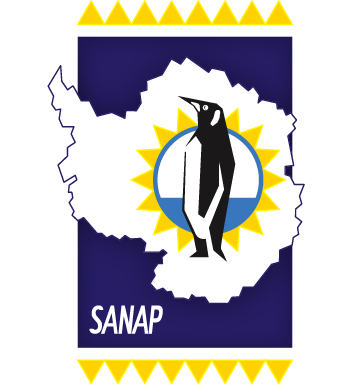












 LEARNER (FET) APPLICATION FORM
LEARNER (FET) APPLICATION FORM SEAmester – South Africa’s Class Afloat aims to introduce marine science as an applied and cross- disciplinary field to students who have shown an interest in the core science disciplines. It combines traditional classroom lectures with hands-on ship-based deck activities; while providing them with an opportunity to support specialist scientists in recognised marine research activities. During the voyage, students will engage in classroom lectures, assignments, and hands-on research activities, covering topics such as physical oceanography, marine biology and environmental science. Learners will also work with sophisticated instrumentation, collect data and gain experience in data analysis and scientific research techniques. The research group comprises over 30 oceanographic, fisheries, biogeochemical and biological experts, who jointly have trained over 600 Southern African students onboard a wide variety of international and local research vessels.
SEAmester – South Africa’s Class Afloat aims to introduce marine science as an applied and cross- disciplinary field to students who have shown an interest in the core science disciplines. It combines traditional classroom lectures with hands-on ship-based deck activities; while providing them with an opportunity to support specialist scientists in recognised marine research activities. During the voyage, students will engage in classroom lectures, assignments, and hands-on research activities, covering topics such as physical oceanography, marine biology and environmental science. Learners will also work with sophisticated instrumentation, collect data and gain experience in data analysis and scientific research techniques. The research group comprises over 30 oceanographic, fisheries, biogeochemical and biological experts, who jointly have trained over 600 Southern African students onboard a wide variety of international and local research vessels.
 APPLICATION REQUIREMENTS
APPLICATION REQUIREMENTS
 Training Tomorrow’s Oceanographers
Training Tomorrow’s Oceanographers As the field of ocean science evolves, SEAmester is committed to incorporating emerging disciplines such as marine robotics, climate science, and biotechnology into its curriculum. This ensures that students are well-prepared for the challenges and opportunities of the future direction and foci of marine sciences. Recognizing the importance of accessibility, SEAmester continues to develop and teach digital learning/mapping/visual platforms to complement its on-board training.
As the field of ocean science evolves, SEAmester is committed to incorporating emerging disciplines such as marine robotics, climate science, and biotechnology into its curriculum. This ensures that students are well-prepared for the challenges and opportunities of the future direction and foci of marine sciences. Recognizing the importance of accessibility, SEAmester continues to develop and teach digital learning/mapping/visual platforms to complement its on-board training.
 Prof Isabelle Ansorge of UCT and PI of
Prof Isabelle Ansorge of UCT and PI of 
 She outlined the strength of SEAmester is that it combines theoretical classroom learning with the application of this knowledge through ship-based, and more importantly, hands-on research through the Agulhas System Climate Array (ASCA) programme. During past voyages 241 students from 26 universities all over South Africa having participated in these cruises. The presentation showed how successful this programme has been, but also the challenges that have been faced. A few were showcased of what has become of some of the
She outlined the strength of SEAmester is that it combines theoretical classroom learning with the application of this knowledge through ship-based, and more importantly, hands-on research through the Agulhas System Climate Array (ASCA) programme. During past voyages 241 students from 26 universities all over South Africa having participated in these cruises. The presentation showed how successful this programme has been, but also the challenges that have been faced. A few were showcased of what has become of some of the 
 Rudzani Silima, the top student for SEAmester in 2019 gave a
Rudzani Silima, the top student for SEAmester in 2019 gave a 
 Sandy Thomalla of
Sandy Thomalla of 
